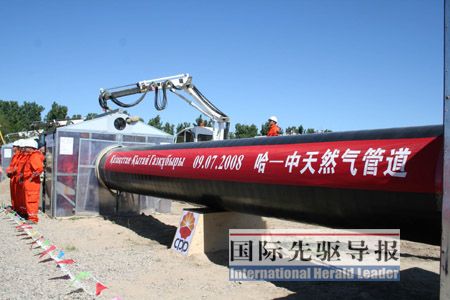 China and Kazakhstan agreed on Saturday to build and finance a gas pipeline and deepen atomic energy ties, extending Beijing's influence in a region where it has used its financial might to access natural resources.
China and Kazakhstan agreed on Saturday to build and finance a gas pipeline and deepen atomic energy ties, extending Beijing's influence in a region where it has used its financial might to access natural resources.
Chinese President Hu Jintao and Kazakh leader Nursultan Nazarbayev presided over the deals between state companies that give Beijing greater access to resources and allow Kazakhstan, Central Asia's biggest economy, to diversify its energy exports. "Thanks to our joint strengths, Sino-Kazakh relations will undoubtedly reach new levels," Hu said after meeting Nazarbayev.
Lying on some of the world's biggest oil, gas and metals reserves, Central Asia is at the centre of a geopolitical tug-of-war between Russia, China and the West, all seeking to grab a share of its untapped riches.
China's foray into Central Asia represents a challenge to Russia, which still sees the region as part of its sphere of influence. It is also a worry for Europe, which hopes the energy-rich region can be an alternative new supplier of gas.
State companies KazMunaiGas [KMG.UL] and China National Petroleum
Corporation (CNPC) agreed to build and finance the Kazakh leg of a natural gas pipeline network. The $3.0 billion to $3.5 billion investment cost will be shared equally. The Beyneu-Shymkent pipeline will join a larger pipeline that snakes 1,833 km (1,139 miles) across Central Asia from a gas field developed by the Chinese in eastern Turkmenistan. Hu opened the larger pipeline in December.
KazMunaiGas President Kairgeldy Kabyldin said the Kazakh pipeline would have capacity of 15 billion cubic metres (bcm). A first stage, to be completed by the start of 2014, would have capacity to deliver 10 bcm.
Kabyldin said the pipeline would allow Kazakhstan to provide energy security for its southern regions, an area that currently relies heavily on gas from neighbouring Uzbekistan.
"Secondly, it will allow us to diversify our export options. Today we are exporting gas only via (Russian state company) Gazprom (GAZP.MM)," he said.
The bigger Central Asia-China route will have capacity to deliver 40 bcm when it is completed in 2013 or 2014.
URANIUM SUPPLY
Chinese resource firms have already established a foothold in Kazakhstan.
Among recent deals, China Development Bank agreed last year to lend up to $2.7 billion to copper miner Kazakhmys (KAZ.L) and CNPC tied up with KazMunaiGas in a $2.6 billion deal to take over oil firm MangistauMunaiGas.
Kazakhstan, which last year surpassed Canada to become the world's largest uranium miner, will also increase shipments to China after its state nuclear company agreed a supply contract on Saturday during the presidential visit.
Kazatomprom will supply uranium to China Guangdong Nuclear Power Corporation (CGNPC), details of which were not disclosed. CGNPC -- which operates over 40 percent of China's nuclear power generating capacity -- said in April 2009 it would develop a uranium deposit in Kazakhstan with reserves of 40,000 tonnes together with Kazatomprom.
China plans to import a total of 24,200 tonnes of Kazakh uranium between 2008 and 2012.
A third agreement signed on Saturday will allow for cooperation between Kazakhstan and China on the peaceful development of nuclear energy.
The World Nuclear Association says there are 439 nuclear reactors operating worldwide today. Plans exist to construct 57 more: China is constructing 23 of them. (Writing by Robin Paxton in Almaty; editing by Philippa Fletcher)
Reuters




